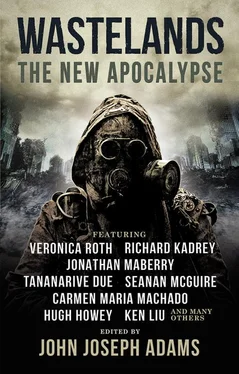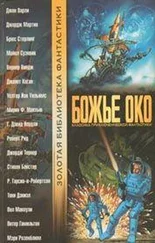We sit in our bed in the big main building of the Coast Guard station—no one lives in the houses because they are too hard to defend. Our home is a mattress and box spring sitting on the floor of an office, next to a desk. I feed Kate a yellow M&M and eat a brown one.
“Don’t eat all the brown ones,” she says.
“Oh, do you like them best?”
“No, you’re giving me all the pretty ones and eating all the broken and brown ones.”
“I ate yesterday,” I say.
“I ate today.” She picks up a red one and holds it out to me on the palm of her hand.
I take it.
“I’m sorry,” I say. “I’m sorry I ate.” I wish they had surrendered before.
“I want you to eat,” she says.
“You’re not.”
“I am,” she says, and pops an M&M in her mouth. “Now I am again.”
I sigh and settle on my side.
“Promise me you’ll eat me,” she says. “If it happens.”
I don’t say anything.
“You’re so brave,” she whispers. “I would if I could but I can’t. I can’t be like you.”
I smell the M&M’s and the dusty carpet. I feel the bones of my hips on the mattress.
“Eat me because I love you,” she says. “Because you love me. Because you have to. Promise me.”
Veronica Rothis the #1 New York Times bestselling author of the Divergent Series ( Divergent, Insurgent, Allegiant , and Four: A Divergent Collection ) and the Carve the Mark series ( Carve the Mark, The Fates Divide ). Her short stories and essays have appeared in the anthologies Summer Days and Summer Nights, Shards and Ashes , and Three Sides of a Heart . The Divergent Series was developed into three major motion pictures. Veronica grew up outside of Chicago and graduated from Northwestern University. She now lives in Chicago proper with her husband and dog and writes full-time. You can find Veronica on Facebook and Instagram ( @vrothbooks) or at her website ( veronicarothbooks.com). Her next two books are a YA short story collection, The End and Other Beginnings: Stories from the Future (fall 2019, HarperCollins), and her adult fiction debut, The Chosen One (spring 2020, John Joseph Adams Books).
Tabor Kata stood alone near the hatch of her one-person domicile ship, waiting as her vacsuit pressurized. An oxygen tank was fixed to her back, enough for two hours’ worth of exploring before she’d choke to death on poison. When the tank was low, or if it began to leak, the whole thing would start whistling like a tea kettle. The first time that had happened, she had screeched at the sound, making Drobo laugh at her—without actually laughing, in that way only progs could.
“There is no need to panic ,” Drobo had said in her ear.
He—“it,” really, because he had no physical body, and no gender preference, but she thought of Drobo as a “he”—had asked her once how she could tell that he was mocking her, so that he could adjust his voice modulator accordingly. I just know, she had said. It’s instinct, or something.
The faceplate of her helmet was cloudy from the heat of her exhalations. She smacked it with a gloved hand. “Stupid busted junk,” she said. She had purchased it from a SILF—Synthetic Intelligent Life Form—in a back alley of the exodus town of Third City. And nothing quality ever came out of Third City.
“Striking your suit will not accomplish anything ,” Drobo said in her ear. “ I will adjust the internal controls .”
“Thanks,” she said, and bounced on her toes as she waited for the glass to clear. She didn’t like coming back here, to a ruined Earth, to an abandoned home. But this was more important than her preferences.
The helmet offered maximum visibility, transparent at the front and sides, streamlined, and coated so it was less reflective. Once the glass was clear, she looked around to get her bearings.
Kata had touched down in the middle of a street in Cluj-Napoca, Romania, beside the crumbling Szent Mihály church in the middle of Old Town. The square—Plata Unirii—reminded her of the annual Christmas Fair held there, where she had gone for hot cider as a child… and also to watch people fall on their asses while they tried to ice skate, of course.
And now—no Christmas Fair, no ice skaters, no people . No movement, even, but for the scurry of a cockroach every now and then. She had always heard they would survive the apocalypse, but she had not thought of what that would look like—the shock of organic movement in a now-inorganic world.
“May I help?” Drobo asked.
“No,” Kata said, her voice rough. “Be quiet.”
“ Very well ,” he said, but he wasn’t happy about it. She could hear that in his voice, too.
Kata walked south, toward Strada Avram Iancu, and behind it, the steep slope of the cemetery. She had seen it from the air, headstones and tombs poking up like little broken teeth from the overgrown hillside. During All Saints Day, it had glowed red with candles placed beside each grave, surrounding them. Remembering them. She had walked those paths with her father, her hand in his, the living coexisting with the dead. Just as she did now, only now there were far more dead than living.
Cluj had been in the radiation zone surrounding one of the massive blasts of the WMDs that had struck Europe. The city had been evacuated before the catastrophe, so there were no bodies in the streets, no leveled buildings. There were some signs of upheaval if she cleared dirt from the windows—drawers pulled open and left that way, books scattered on the floor as objects were pulled from bookshelves, torn tapestries dangling from whitewashed plaster. It was an old city, and a new one, and a city in between—traditional buildings painted lively colors next to beige brutalist structures from the Communist era, modern minimalist white towers that glinted with windows jammed between the maximalist neo-Baroque facades that had come next. Layer after layer of time.
She walked the narrow alley where shop signs, half in English, half in Romanian, boasted of plăcintă and fresh produce and, for some reason, camera equipment. There were so many nooks and crannies in the city that she had not gotten to explore. Her brother had been fond of the dim hardware stores with nuts and bolts in little tubs that had prices scribbled on the outside. 2 lei. 1 leu. 5 lei. Her mother had favored the newer shops in Iulius Mall, which also had a Starbucks.
Kata reached the end of the alley and crossed the street to the house. It stood right over the sidewalk, decorative bars shielding its windows with curlicues, stately stone cracked in places and dotted with graffiti. She had to kick open the gate—not difficult, since it was barely hanging on to its hinges—but the door to the front apartment was already open.
It was a simple place but for the wood-burning stove in the corner, which was decorated with glazed green tiles. The narrow kitchen table was bare, the stools pushed neatly beneath it. The whitewashed wall was streaked with water that had leaked from one of the pipes leading to the baseboard heaters. For all that the world had advanced—to develop progs, to build SILFs (or “sylphs,” as most people called them), to settle on other planets and begin to terraform them—so many things hadn’t changed. Water heaters on the walls, elegant bars on the windows, sobe de teracotă in the older houses, red candles on the cemetery graves.
The old world persisted.
The only other aberration she could find was a worn teddy bear perched on top of the lamp in the corner. She pinched its worn ear and lifted it, testing its weight.
Читать дальше


![Nick Cracknell - The Quiet Apocalypse [= Island Zero]](/books/28041/nick-cracknell-the-quiet-apocalypse-island-zero-thumb.webp)









